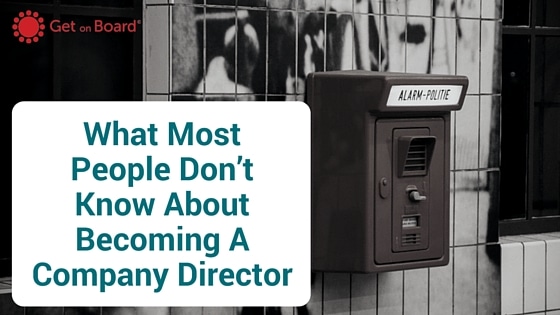What most people don’t know about becoming a company director

Regularly talking with aspiring company directors is one of the best parts of my job. It also gives me great insight into their mindset when it comes to starting their board career. Sadly, it appears that they are receiving information about being a company director that is not entirely accurate and that actually causes them to hold back on starting their directorship journey.
Today I’m going to debunk three of the most common myths that I hear from aspiring company directors.
Myth #1 – You need a qualification to be a company director
Contrary to popular belief, there is no requirement for a person to hold a minimum qualification in order to become a company director. For first time company directors the legal requirements for a person only extend to two main factors: be at least 18 years of age; and is not a current (undischarged) bankrupt. There are other criteria that can stop you from becoming a company director; however, these generally relate to breaches conducted and bans received as a director. You must also consent in writing to becoming a director.
Whether a low barrier to entry is good or bad for organisations really comes down to your perspective. The negatives are quite obvious; however, the positives include being able to appoint or nominate diverse candidates; for example, younger people with no prior board experience who bring unique insights and fresh ideas to the boardroom. It also helps organisations that would otherwise find it difficult to attract candidates to draw from a larger candidate pool.
I also think that it is wise – and your responsibility as a director – to undertake director develop programs, seminars, and workshops to ensure you are up to date with the requirements of your role as a company director.
Myth #2 – You are not liable and/or responsible if you are a volunteer director
Unfortunately I hear this line espoused by current company directors, not just aspiring directors. How wrong these people are. The Corporations Act 2001 – where you’ll find the duties and responsibilities of directors noted – does not provide different rules for volunteer directors. Nor should it. You are still dealing with peoples’ lives (staff and volunteers), still making decisions of the activities of the organisation, and still required to adhere to the same laws (e.g. workplace health and safety) as all other organisations that have paid board members do.
Even if it were true (that you are not as responsible as a paid board member), I would think that you would approach your role as a director of any-sized organisation with the highest possible standard.
Myth #3 – You have nothing to offer
This perception is so common amongst the most smart, creative, and committed aspiring directors. These people with so much to offer any organisation – especially a small not-for-profit – feel so intimidated when they think of boards and company directors. They see it as a mysterious domain of old, stuffy men who all went to private school together.
Thankfully that is actually changing; however, the stereotype is taking longer to die.
Yes, boardrooms are full of smart people, but generally they are no smarter than you are. Furthermore, you will have things to offer that current board members cannot. For example, if you’re the typical reader of this blog, you have up-to-date knowledge in your field of expertise and can bring these best-practices to the organisation, you understand the average workers’ perspective (and what impact the board’s decisions will have on the organisation’s workers), you have energy and time to commit to not only the board but committees as well, you have fresh ideas and bring a new perspective to the organisation, and you have an expertise that may be missing and needed to successfully take the organisation forward.
If you’re stuck on figuring out what makes you special, ask a trusted friend, boss, or advisor to share what they see as your strengths and points of difference that you could offer a board.
Being a company director is not as overwhelming or difficult as first appears. Part of the process is knowing the truth, and the other part is having the confidence in yourself. Hopefully this post gives you a little boost in confidence and clarity about your future directorship journey.
